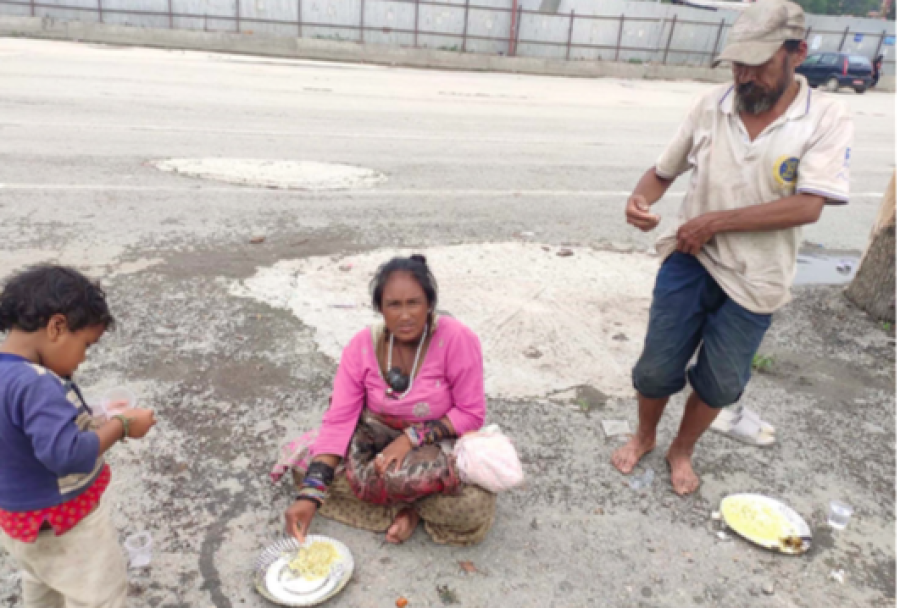National
Lockdown has pushed a family of rickshaw puller to the brink
At 64, Kaila Tamang is planning to quit his profession of 35 years old and become a porter. If it doesn’t work he says he will beg on the streets to feed his family.
Anup Ojha
For sixty-four-year-old rickshaw driver Kaila Tamang, the lockdown of nearly three months not only robbed him of his livelihood, but also discontinued the medication of his 45-year-old wife Basanti, who is suffering from a mental illness.
Within two weeks into the lockdown which came to force on March 24, Kaila ran out of money to support his wife and their two children, two-year-old daughter Bunu and eight-months-old son Dawa Tsering.
Since then, the family has been living off free meal handouts.
Every day, at around 11am, the couple leaves their tiny room in Lagan Tole with their two children and walk towards Khulla Manch, where a local youth organisation, Naya Bus Park Yuba Samaj, has been distributing free meals.
The lockdown has put the family in dire straits. Their rent is due, they have some rice and vegetable oil but no gas to cook, the only source of income for the family has been shut by the lockdown.
“This lockdown has made my life too complicated,” said Kaila as he waited in a meal queue with his wife and their two children on Saturday morning.
As Kaila spoke of the misery brought upon his family by the Covid-19 pandemic and the lockdown, Basanti, his wife, seemed distant. She had numerous rubber bands and bracelets on her forearms and a beads necklace and a fist-size plastic ball stringed around her neck. As the family sat for their meal, Basanti’s attention was elsewhere. Her reverie was broken only when Kaila reminded her to finish her meal.
“She has a mental problem. Every now and again, she shouts and rambles. But she is gentle with the children,” Kaila said.
Doctors have told Kaila that it would cost him at least Rs 300,000 to cure his wife. Kaila said he cannot even imagine earning that kind of money pedalling a rickshaw.
“I had been feeding her medicines, but now I do not have money to even buy milk for my children.”
In the evening, the family has been eating packed meals distributed by the same group at Khulla Manch.
“I had received a sack of rice and a litre of oil as a relief from a social organisation during the early weeks of the lockdown, but I don’t have the money to buy gas to cook them,” Maila said. “I haven’t paid the rent for the past three months and my landlord scolds me every day.”
More than anything, Kaila said he was concerned about the condition of his wife and his two children. If it were not for the free meal programme, he said his family would be begging on the streets by now.
When asked whether the Kathmandu Metropolitan City offered his family any aid during the lockdown, Kaila replied in the negative. “The city officials asked for my citizenship for relief materials and I don’t have a citizenship document,” he said.
The city office has claimed that it has so far distributed relief materials to 249,183 people, but there is no count of people like Kaila who were denied food assistance for not having citizenship certificates.
Until now, Kaila has somehow managed to feed two squares of meal to his family. But he knows he cannot continue to rely on charity meals forever.
He is planning to change his profession, quit his job as a rickshaw puller, which he has done continuously for the past 35 years, ever since he left his village of Lekpani in Kavre and came to Kathmandu.
“Maybe I’ll become a porter. But since I am already past my 60’s, I don’t know if my body can take it. I have a wife and two children to look after. If nothing works, I’ll beg on the streets to feed my family,” Kaila said.




 13.12°C Kathmandu
13.12°C Kathmandu.jpg)














